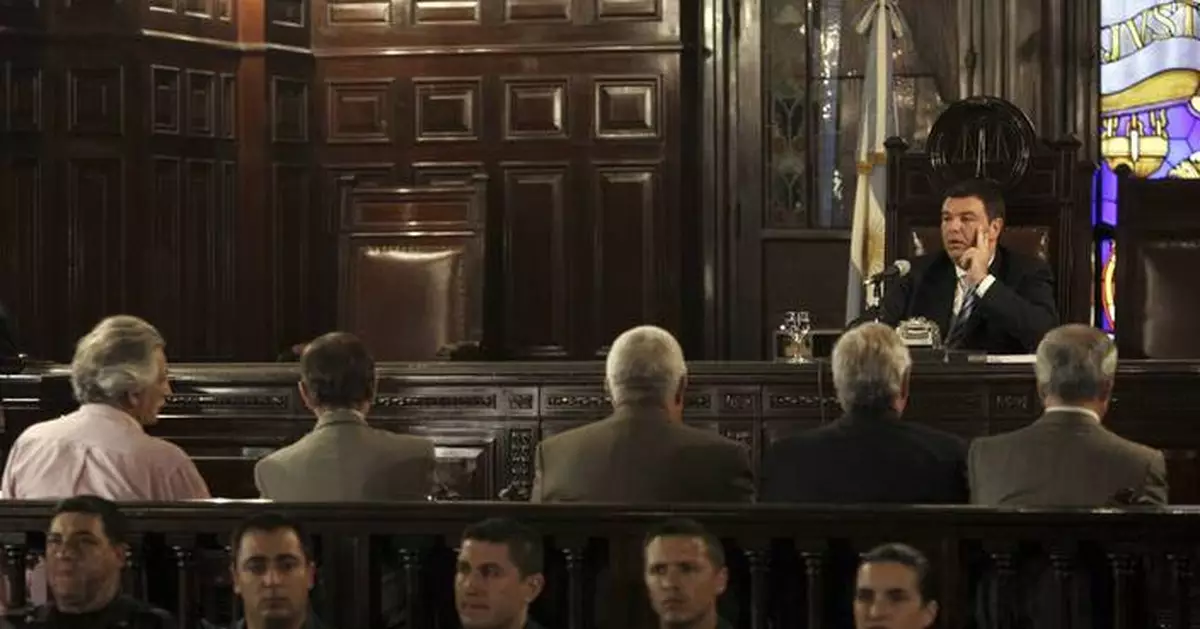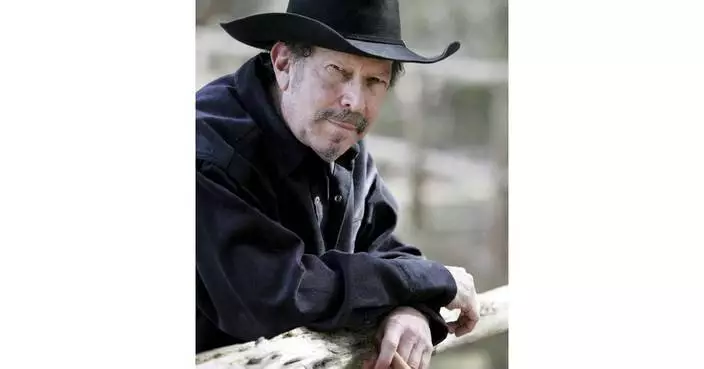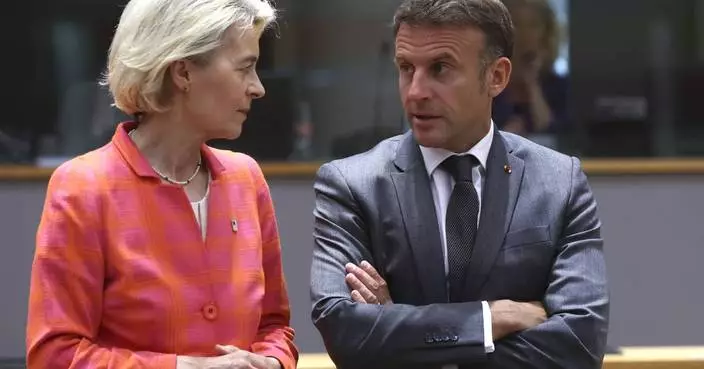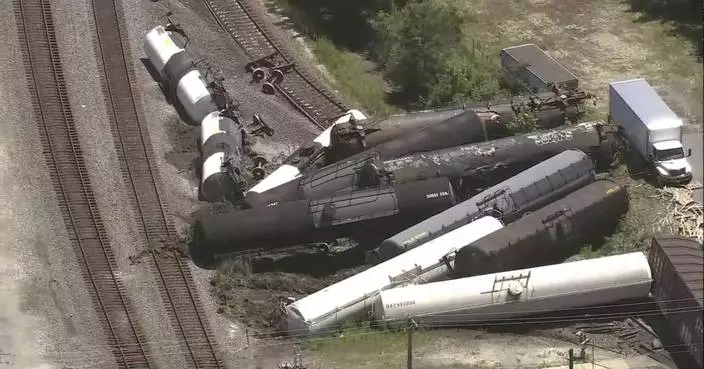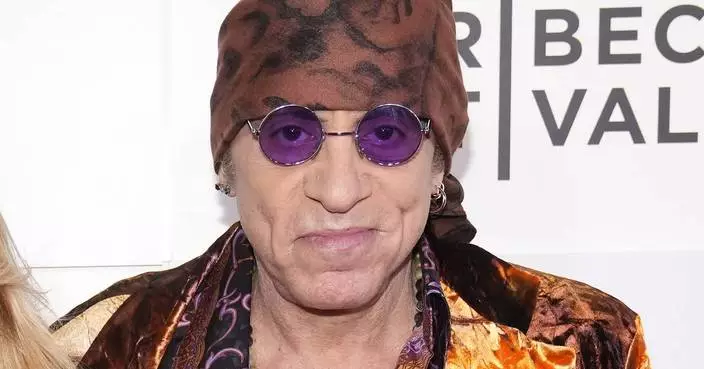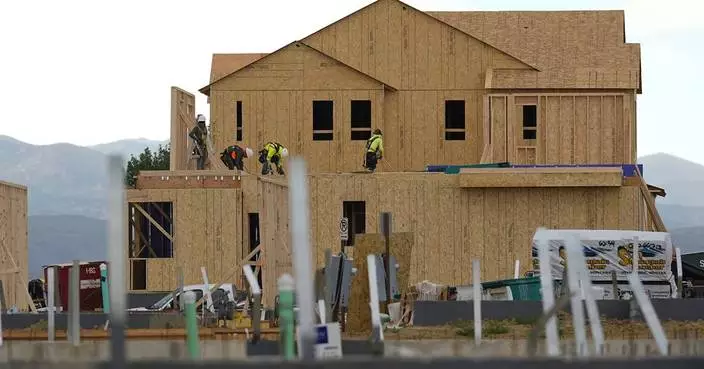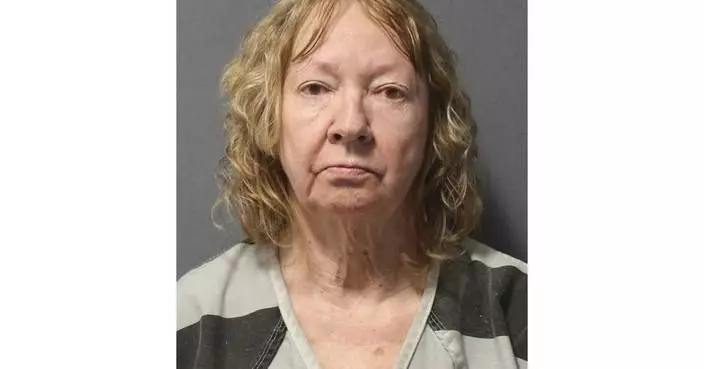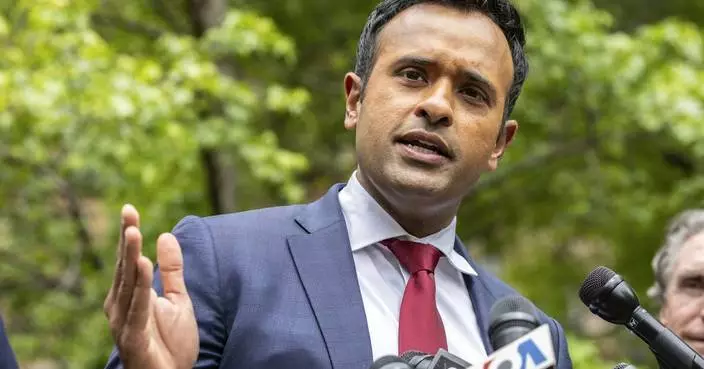BUENOS AIRES, Argentina (AP) — Campaigning last year as a libertarian outsider, Javier Milei electrified rallies with his vows to destroy Argentina’s corrupt political elite. But the eccentric economist-turned-president now faces accusations of hypocrisy over his Supreme Court nomination.
What makes his choice of Ariel Lijo, 55, so extraordinary is not just the judge's lack of appellate experience or scant scholarly publications, but that he has been accused of conspiracy, money laundering and illicit enrichment, and has come under scrutiny for more ethics violations than almost any other judge in his court’s history.
“This is a massive regression, an effort to undermine the judiciary and the fight against corruption,” said Juan Pappier, deputy director of the Americas at Human Rights Watch. “This is Milei’s biggest contradiction.”
The backlash to Lijo's May 28 nomination was swift. Protestors rallied outside the Supreme Court. Legal watchdogs, business groups and newspapers castigated Milei for elevating an exemplar of the class that he had vowed to disrupt.
But Lijo has allies across the political spectrum, and Milei predicts an easy confirmation, even though the president's political isolation has frustrated his efforts to get a single bill passed in six months. After an explosion of violent protests, Milei’s radical state overhaul, a 232-article bill that grants the president enlarged powers over the economy, squeaked through the Senate last week.
“Lijo is special in that he can get the votes,” said Alberto Garay, president of the Buenos Aires Bar Association. “It’s not about getting respected jurists in the court, it’s about friends."
An aide to Lijo told The Associated Press that the judge would not speak to reporters until after his Senate confirmation hearing, expected in the coming weeks.
As soon as he took office, Milei — who raffled his monthly salary as a lawmaker — launched what he labeled a shock economic adjustment to address Argentina's failing finances, but its success hangs on a wave of court challenges.
Without allies in Congress, the president relied on a controversial emergency decree to deregulate the labor market. Judges suspended major sections of the measure after unions complained it was unconstitutional. Milei argues that as annual inflation nears 300%, Argentina’s economic crisis constitutes an emergency that justifies the sweeping decree under Argentina's constitution. Lawyers disagree.
“Every constitutional democracy is based on the notion of limited executive power,” said Ricardo Gil Lavedra, a constitutional lawyer and former justice minister. “If Milei can get the judges he wants through the Senate, he'll have a court that won't unravel his reforms.”
Milei says that Lijo's investigations into top officials have shown his anti-corruption credentials. But otherwise, his tepid defense of Lijo against the fusillade of attacks has done little to quell speculation.
Asked by a Buenos Aires radio station why Lijo was a good choice, Milei paused before saying, “There is a relative advantage in that Lijo knows how the justice system works."
Even Milei's allies have fought back. Libertarian economist Alberto Benegas Lynch, Milei’s intellectual mentor, said he is “alarmed.” Vice President Victoria Villarruel expressed disappointment.
The Argentine-American Chamber of Commerce warned the nomination could damage Milei's efforts to secure international investment.
Lijo is beset with accusations of misconduct.
Perhaps most unnerving, critics say, is a 2018 criminal case accusing Lijo and his millionaire brother, Alfredo, of conspiring to perform official favors for wealthy businessmen in exchange for money and shell companies. Prosecutors accused them of amassing a fortune by disrupting judicial proceedings against tycoons and officials.
Argentina’s anti-money laundering agency investigated the brothers' business associations and properties, saying their “inexplicable increase in assets" raised suspicions. But in 2021, with investigations in full swing, the case was dropped for lack of evidence at the request of Mariano Cúneo Libarona, Lijo's then-lawyer, who is now Argentina's justice minister.
For years, political commentators have joked about Lijo's talent for throwing out sensitive corruption cases against powerful officials, dubbing him the “court anesthesiologist." Legal experts say his record of shelved cases epitomizes what is wrong with sluggish judiciaries regionwide.
“We see a pattern in autocracies all over Latin America, where the first thing that leaders do is undermine the independence and integrity of the judiciary,” said María Eugenia Talerico, the former deputy director of the Financial Investigations Unit. “To protect democracy, you need trained, honest and sound judges.”
Since its formation in 1999, the magistrates council, Argentina's top judicial watchdog, has encountered just two Buenos Aires federal judges dogged by more complaints of misconduct than Lijo, who has faced 32 formal denunciations in his 20-year career, Argentina’s Civic Association for Equality and Justice (ACIJ) found. In the past year, Lijo has faced five impeachment requests, unrivaled in his court.
A 2016 audit by the magistrates council revealed that Lijo caused “unjustified,” delays in 29 cases, some dragging on for 14 years. Of 89 corruption cases in his court, just over 15% went to trial, one of the lowest proportions for Argentine judges, the ACIJ reported.
Lijo has denied holding up the proceedings, blaming the complexity of the court cases for the delays.
Some of the cases still languishing entangle Milei’s political foe, former President Cristina Fernández de Kirchner.
A case accusing the left-wing icon of defrauding the state by seizing Argentine oil company YPF from Spanish energy company Repsol has stalled since Lijo opened it in 2006. His inquiry into alleged money laundering by Kirchner’s 2007 presidential campaign hit a dead end just before going to trial in 2018.
Kirchner has been investigated on roughly a dozen charges, mostly related to corruption, and was sentenced to six years in prison in 2022 for a scheme involving rigged public works contracts.
She has appealed, calling the allegations a political witch hunt. The case will eventually appear before Argentina’s Supreme Court.
The reticence of the typically outspoken ex-president to condemn Milei's top court pick has made local headlines, as has the silence of former center-right President Mauricio Macri. Lijo served as judge in a case alleging that Macri's family company benefited from favoritism in negotiations over the repayment of a multimillion-dollar debt to the state. Lijo never summoned Macri to testify, and the case remains unresolved, the debt unpaid.
A spokesperson for Macri did not respond to a request for comment.
Whether Milei can speed Lijo's nomination through the Senate hinges on the votes of lawmakers aligned with the powerful former leaders, particularly Kirchner, whose coalition holds 33 of 72 seats. In recent weeks, feverish reports of a pact between Milei and Kirchner have captivated Argentine media.
“It’s impossible for her to cast those votes if she doesn’t get a guarantee of impunity in her cases," said leading Argentine political commentator Carlos Pagni.
A spokesperson for Milei did not respond to a request for comment. A Kirchner aide rejected the suggestion that Lijo’s confirmation could ease her legal burdens.
As the confirmation hearing approaches, some senators have pushed the magistrates council to hasten its inquiries into the complaints and impeachment requests still pending against Lijo.
Council President Héctor Recalde denied their petitions in April, indefinitely postponing the probes into Lijo's conduct.
“Judge Lijo is a candidate for the Supreme Court,” Recalde said. “It is not appropriate at this time."
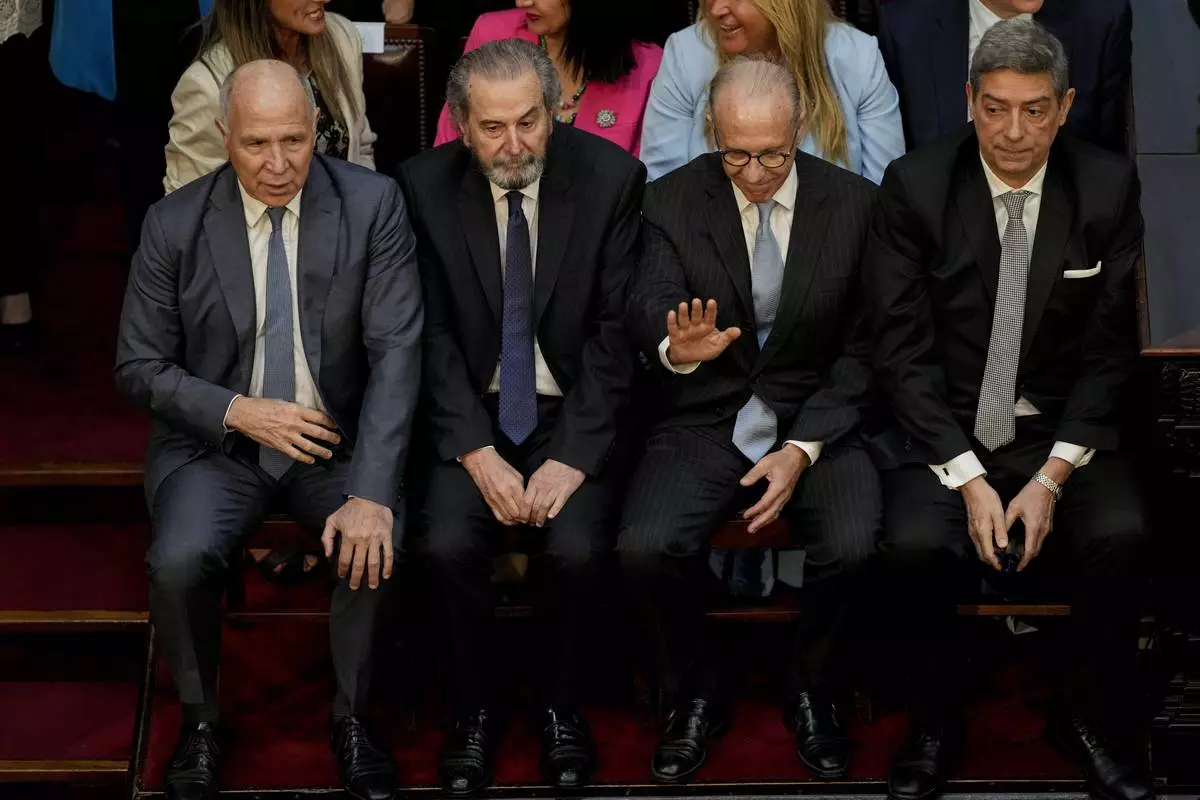
Argentine Supreme Court justices pose for a photo during the opening of a legislative session in Buenos Aires, Argentina, Friday, March 1, 2024. From left are Justices Ricardo Lorenzetti, Juan Carlos Maqueda, Carlos Rosenkrantz and Horacio Rosatti. (AP Photo/Natacha Pisarenko)
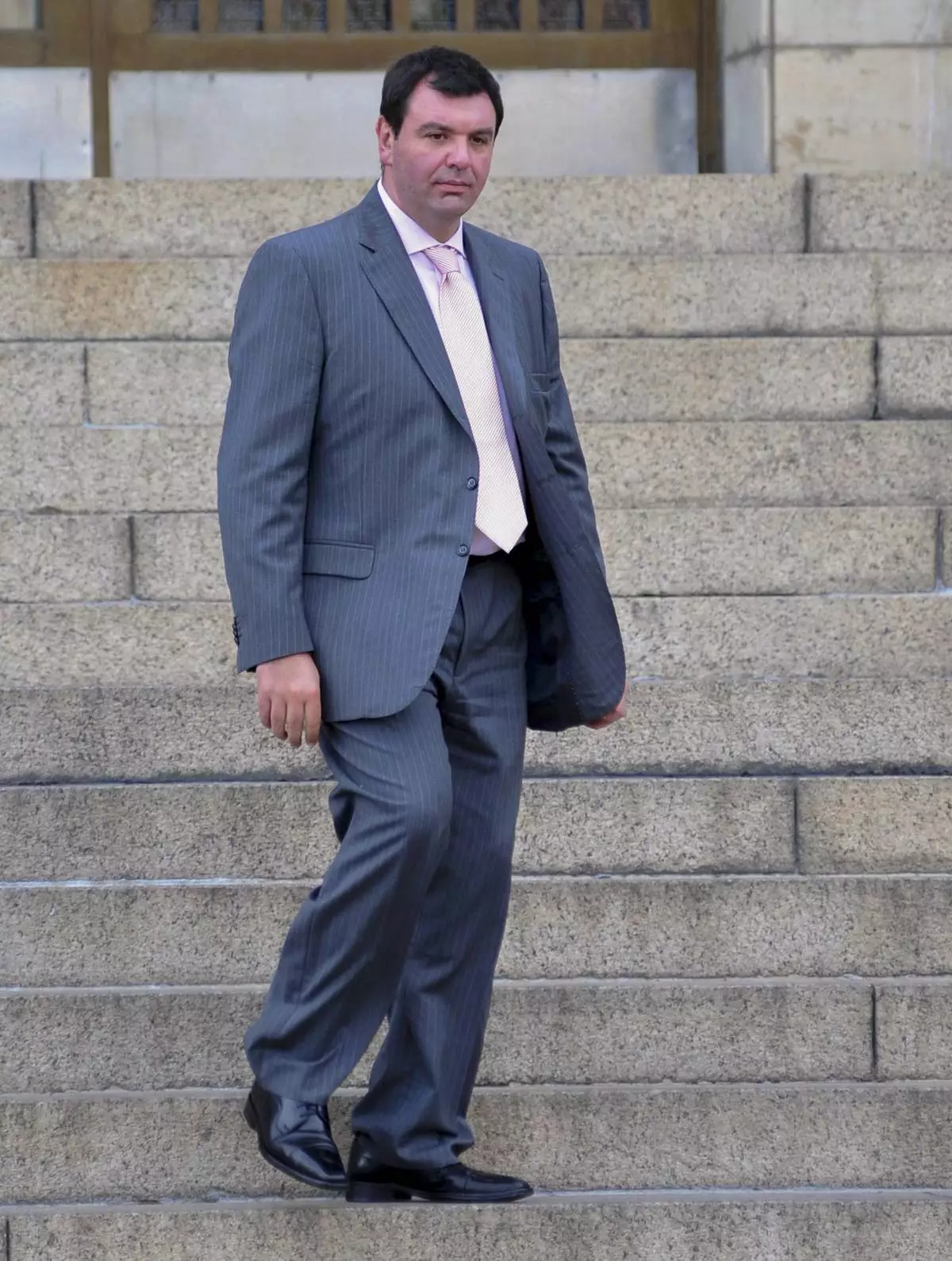
Argentine Judge Ariel Lijo leaves court in Buenos Aires, Argentina, Tuesday, May 15, 2012. President Javier Milei nominated Lijo as a Supreme Court justice on May 28, 2024. (AP Photo/Enrique Garcia Medina)
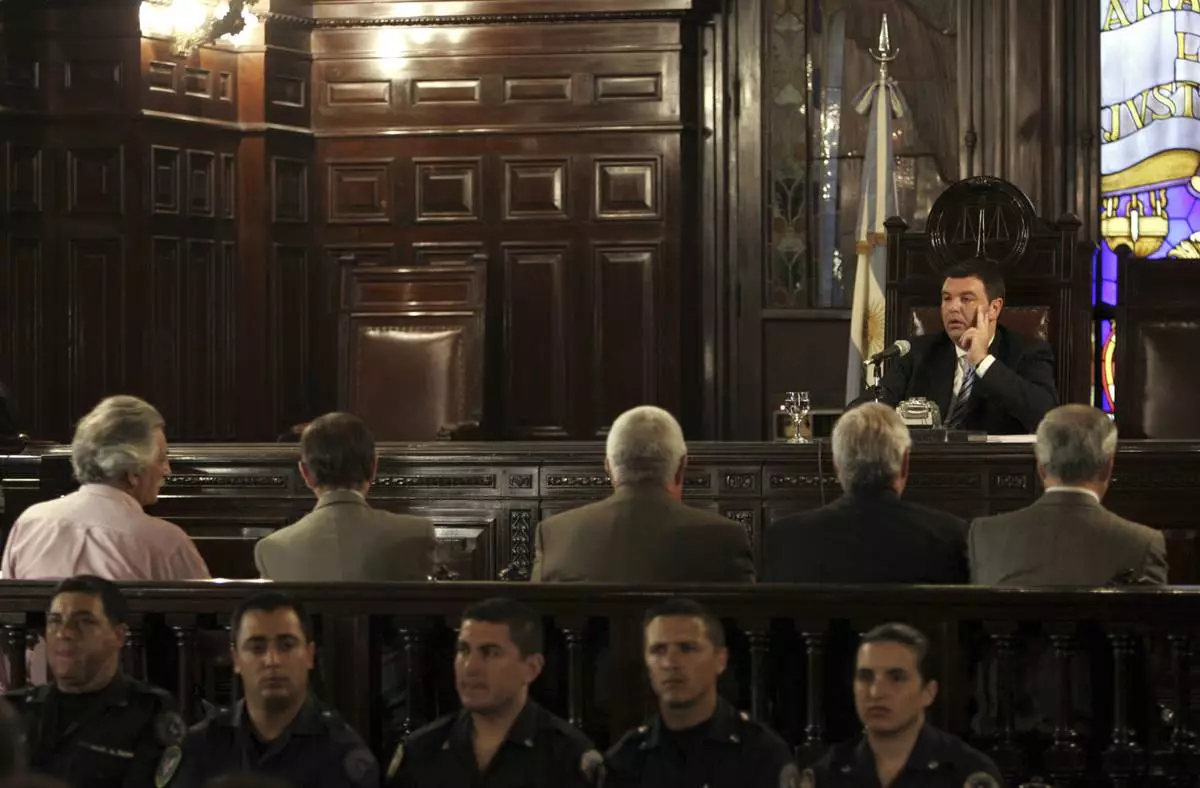
FILE - Judge Ariel Lijo presides over a trial of former military officers being tried for human rights abuses in Buenos Aires, Dec. 18, 2007. President Javier Milei nominated Lijo as a Supreme Court justice on May 28, 2024. (AP Photo/Natacha Pisarenko, File)
LA PAZ, Bolivia (AP) — Supporters of Bolivia’s president rallied outside his palace on Thursday, giving some political breathing room to the embattled leader as authorities made more arrests in a coup that shook the economically troubled country a day earlier.
Bolivia’s government announced that a total of 17 people had been arrested for their alleged involvement in the attempted government take-over, including the army chief, Gen. Juan José Zúñiga, who was arrested the day before.
The South American nation of 12 million watched in shock and bewilderment Wednesday as military forces appeared to turn on the government of President Luis Arce, seizing control of the capital’s main square with armored vehicles, repeatedly crashing a small tank into the presidential palace and unleashing tear gas on protesters. Zúñiga and former navy Vice Adm. Juan Arnez Salvador were both arrested and remained in custody.
Senior Cabinet member Eduardo del Castillo did not elaborate on the other 15 people who were arrested on Thursday other than to identify one civilian, Aníbal Aguilar Gómez, as the “mastermind” of the thwarted coup. He said the alleged conspirators began plotting in May.
Riot police guarded the palace doors and Arce — who has struggled to manage the country's shortages of foreign currency and fuel — emerged on the presidential balcony to condemn Zúñiga and declare that “no one can take democracy away from us.”
Analysts say that the surge of public support for Arce, even if fleeting, provides him with a reprieve from the country’s economic quagmire and political turmoil. The president is locked in a deepening rivalry with the popular former President Evo Morales, his erstwhile ally who has threatened to challenge Arce in 2025 primaries.
“The president’s management has been very bad, there are no dollars, there is no petrol,” said La Paz-based political analyst Paul Coca. “Yesterday’s military move is going to help his image a bit, but it’s no solution.”
Some protesters gathered outside the police station where the former army general was being detained, shouting that he should go to jail. “It’s a shame what Zúñiga did,” said 47-year-old Dora Quispe, one of the demonstrators. “We are in a democracy, not a dictatorship.”
Before his arrest late Wednesday, Zúñiga alleged without providing evidence that Arce had ordered the general to carry out the coup attempt in a ruse to boost the president’s popularity. That fueled a frenzy of speculation about what really happened, and opposition senators and government critics echoed the accusations, calling the mutiny a “self-coup" — a claim strongly denied by Arce's government.
In La Paz's main Plaza Murillo, supporters addressed Arce, yelling, “Lucho, you are not alone!” as fireworks exploded overhead. Lucho, a common nickname for Luis, also means “fight" as a Spanish verb.
Some Bolivians said they believed Gen. Zúñiga's allegations on national TV that the coup attempt was a hoax.
“They are playing with the intelligence of the people, because nobody believes that it was a real coup,” said 48-year-old lawyer Evaristo Mamani.
Lawmakers and former officials, particularly those allied with Morales, bolstered the allegations. “This has been a setup,” said Carlos Romero, a former official in the Morales government. “Zúñiga followed the script as he was ordered."
Soon after the military maneuver was underway, it became clear that any attempted takeover had no meaningful political support. The rebellion ended bloodlessly by the end of the business day. Arce named a new army commander, who ordered troops to retreat.
“Here we are, firm, in the presidential palace, to confront any coup attempt,” Arce said after facing down Zúñiga. Hundreds of the president's supporters surged into streets surrounding the palace Wednesday night, singing the national anthem and cheering for Arce.
The U.S. deputy secretary of state for management, Rich Verma, condemned Zuniga's actions and speaking in Paraguay on Thursday noted that “democracy remains fragile in our hemisphere.”
The short-lived mutiny followed months of mounting tensions between Arce and Morales, Bolivia's first Indigenous president. Morales has staged a dramatic political comeback since mass protests and a deadly crackdown prompted him to resign and flee in 2019 — a military-backed ouster that his supporters decry as a coup.
Morales has vowed to run against Arce in 2025 elections despite a constitutional court ruling that said he was ineligible because he had already served. The possibility of Morales running again has rattled Arce, whose popularity has plunged as the country’s foreign currency reserves dwindle, its natural gas exports plummet and its currency peg to the U.S. dollar collapses.
Morales’ allies in Congress have made it almost impossible for Arce to govern. The cash crunch has ramped up pressure on Arce to scrap food and fuel subsidies that have put a strain on state finances, a combustible move ahead of elections.
Defense Minister Edmundo Novillo said Wednesday's turmoil had its roots in a private meeting Tuesday in which Arce dismissed Zuñiga over the army chief’s threats to arrest Morales if he proceeded to join the 2025 race. Arce has also denied the legitimacy of Morales’ presidential bid.
In their meeting, Zuñiga gave officials no indication he was preparing to seize power, Novillo said.
"He admitted that he had committed some excesses,” he said of Zuñiga. “We said goodbye in the most friendly way, with hugs. Zuñiga said that he would always be at the side of the president.”
Mere hours later, panic gripped the capital of La Paz. Tailed by armored vehicles and supporters, Zuñiga burst into government headquarters and declared the armed forces sought “to restore Bolivia's democracy."
The influx of soldiers sent Bolivians into a frenzy, thronging ATMs, queuing outside gas stations and ransacking grocery stores. By one count, Bolivia has had more than 190 coup attempts and revolutions since its 1825 independence.
The country’s fragmented opposition rejected the coup even before it was clear it had failed. Former interim President Jeanine Áñez, detained for her role in Morales’ 2019 ouster, said that soldiers sought to “destroy the constitutional order," but appealed to both Arce and Morales not to run in the 2025 elections.
Even if proven false, the accusations of Arce's involvement stoked confusion and threatened more chaos. Santa Cruz Gov. Luis Fernando Camacho, also detained for allegedly orchestrating a coup in 2019, demanded answers.
“Was it a media spectacle put on by the government itself, as General Zúñiga says? Was it just some military madness? Was it simply another example of lack of control?” he wrote on social media platform X.
Zúñiga's answer came as a shock, telling reporters that Arce had asked him directly to storm the palace and bring armored vehicles into downtown La Paz.
“The president told me: ‘The situation is very screwed up, very critical. It is necessary to prepare something to raise my popularity,'” Zúñiga alleged the Bolivian leader told him.
Bolivian officials have insisted the general was lying to justify his actions. Prosecutors said they'd seek the maximum sentence of 15 to 20 years in prison for Zúñiga on charges of “attacking the constitution.”
Political experts have struggled to comprehend the reasons driving Wednesday's turmoil.
“This is the weirdest coup attempt I have ever seen,” said Kathryn Ledebur, director of the Andean Information Network, a Bolivia-based research group. “Bolivia’s democracy remains very fragile, and definitely a great deal more fragile today than it was yesterday.”
DeBre reported from Buenos Aires, Argentina.
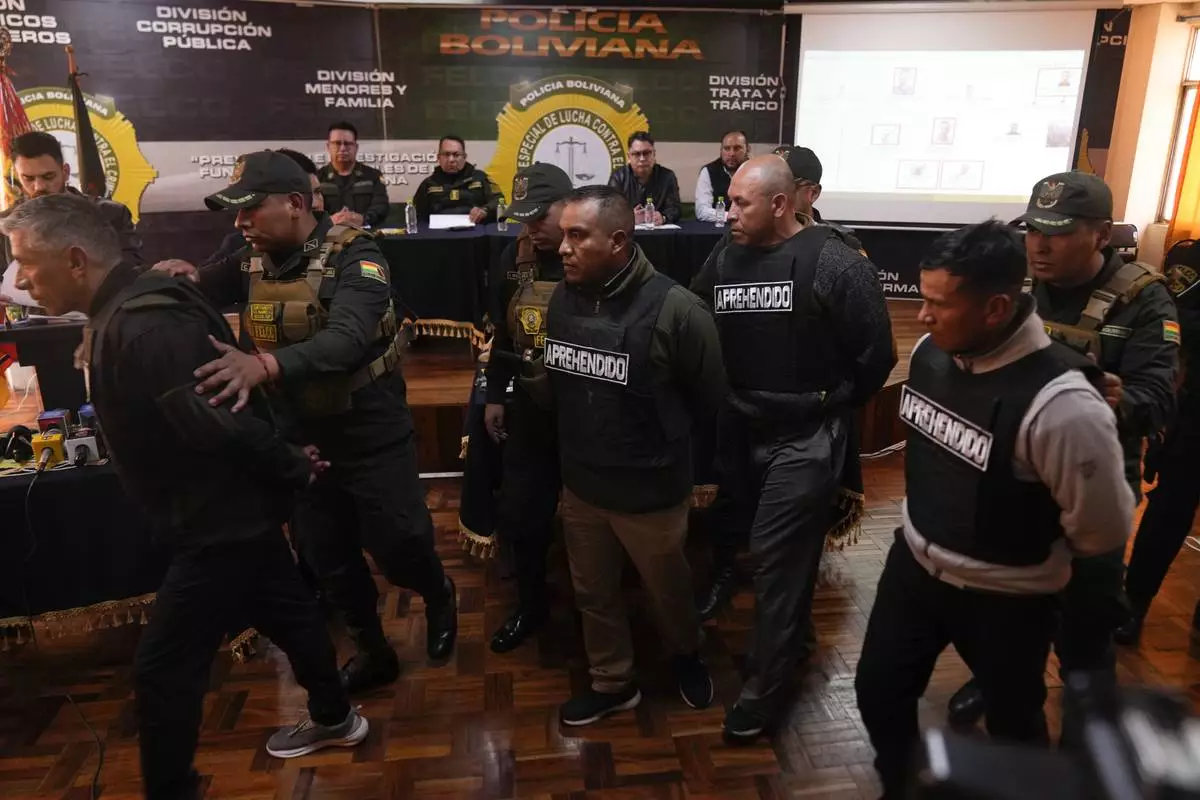
People arrested in connection with the previous day's uprising are presented by the police to the press in La Paz, Bolivia, Thursday, June 27, 2024. The government announced more arrests over their alleged involvement in what President Luis Arce called a coup attempt. (AP Photo/Juan Karita)
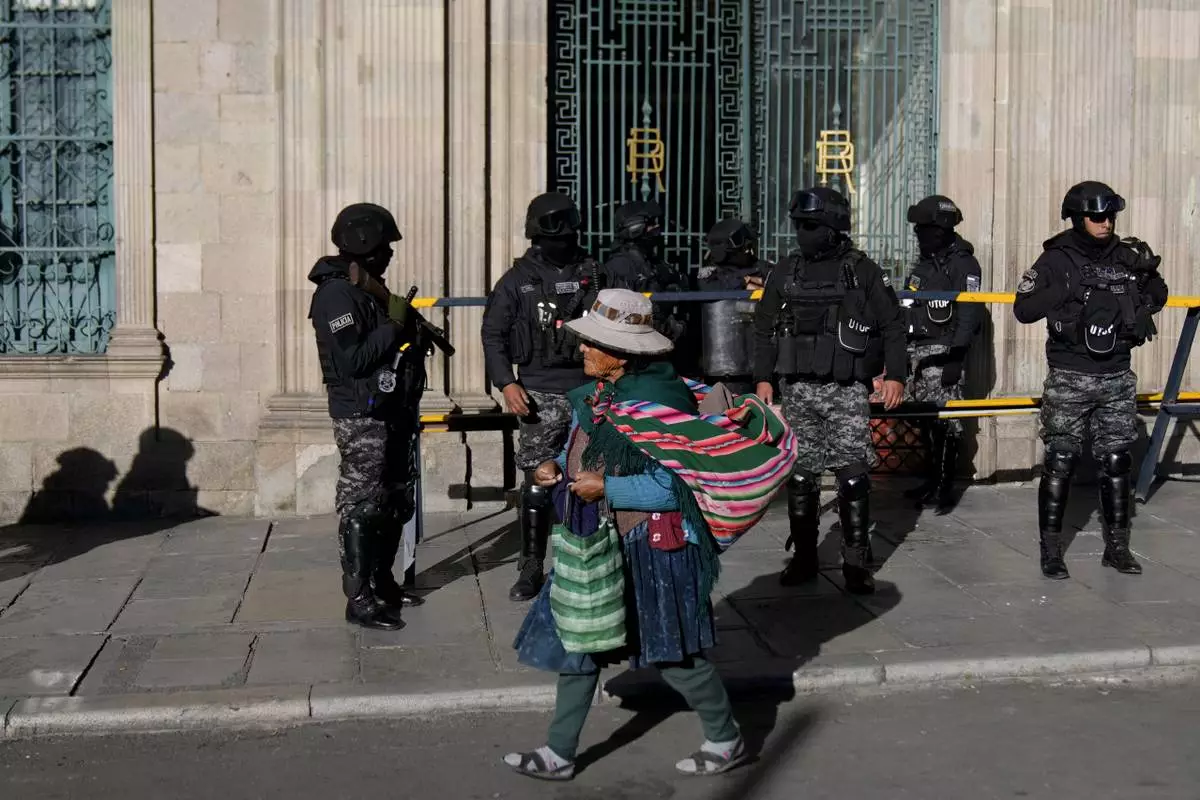
Police guard the government palace the day after a now-ousted Bolivian army chief led some soldiers to storm the building in La Paz, Bolivia, Thursday, June 27, 2024. The rebellion was short-lived as authorities arrested the general and his soldiers retreated. (AP Photo/Juan Karita)
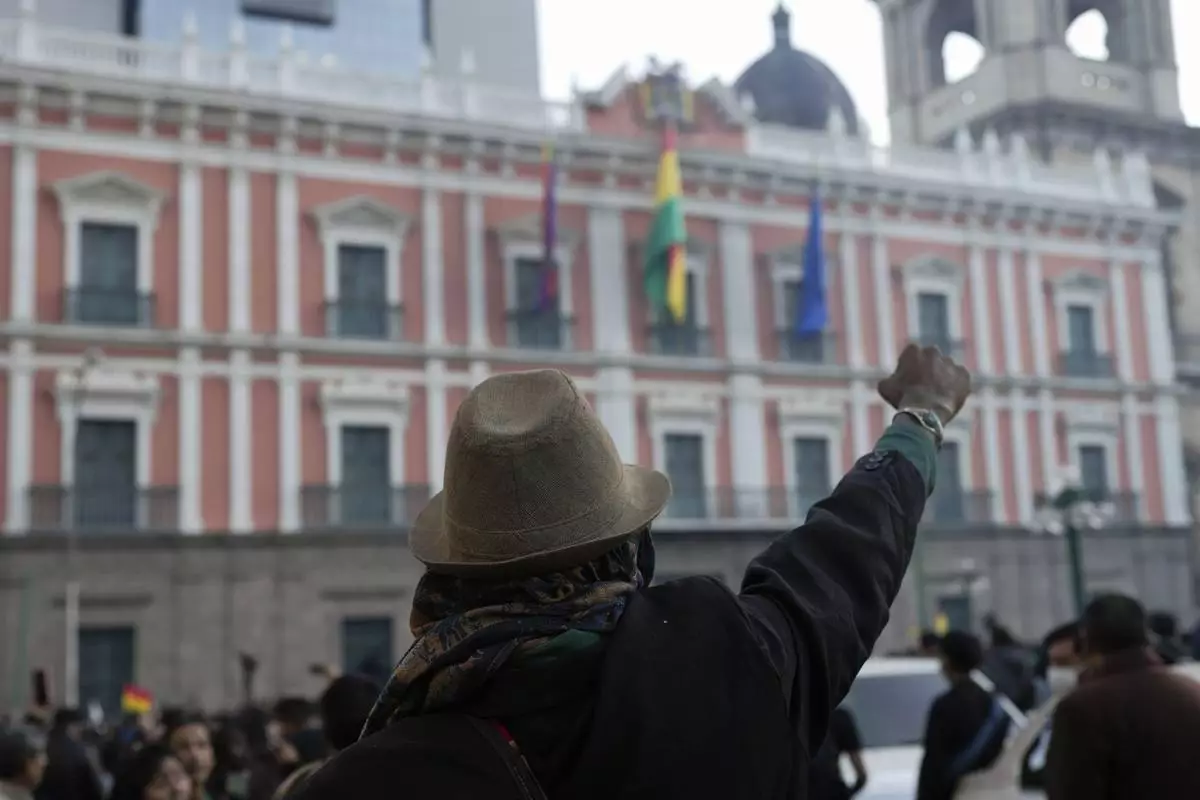
A supporter of Bolivian President Luis Arce raises a clenched fist in front of the government palace in Plaza Murillo, in La Paz, Bolivia, Wednesday, June 26, 2024. Arce addressed supporters who gathered in Plaza Murillo, after Wednesday’s apparent failed coup attempt. (AP Photo/Juan Karita)
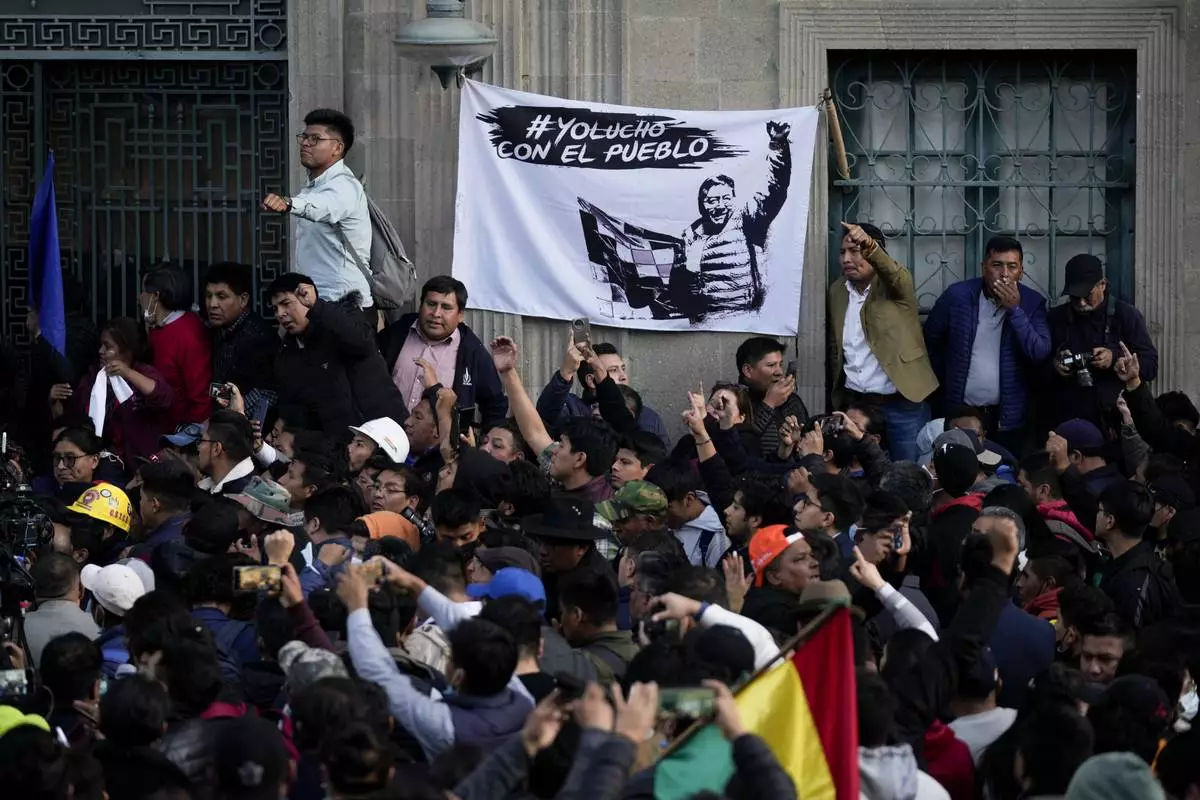
Supporters of Bolivian President Luis Arce crowd into Plaza Murillo in La Paz, Bolivia, Wednesday, June 26, 2024. Armored vehicles rammed the doors of Bolivia's government palace located in Plaza Murillo, in an apparent coup attempt on Wednesday against Arce, but he vowed to stand firm and named a new army commander who ordered troops to stand down. (AP Photo/Juan Karita)
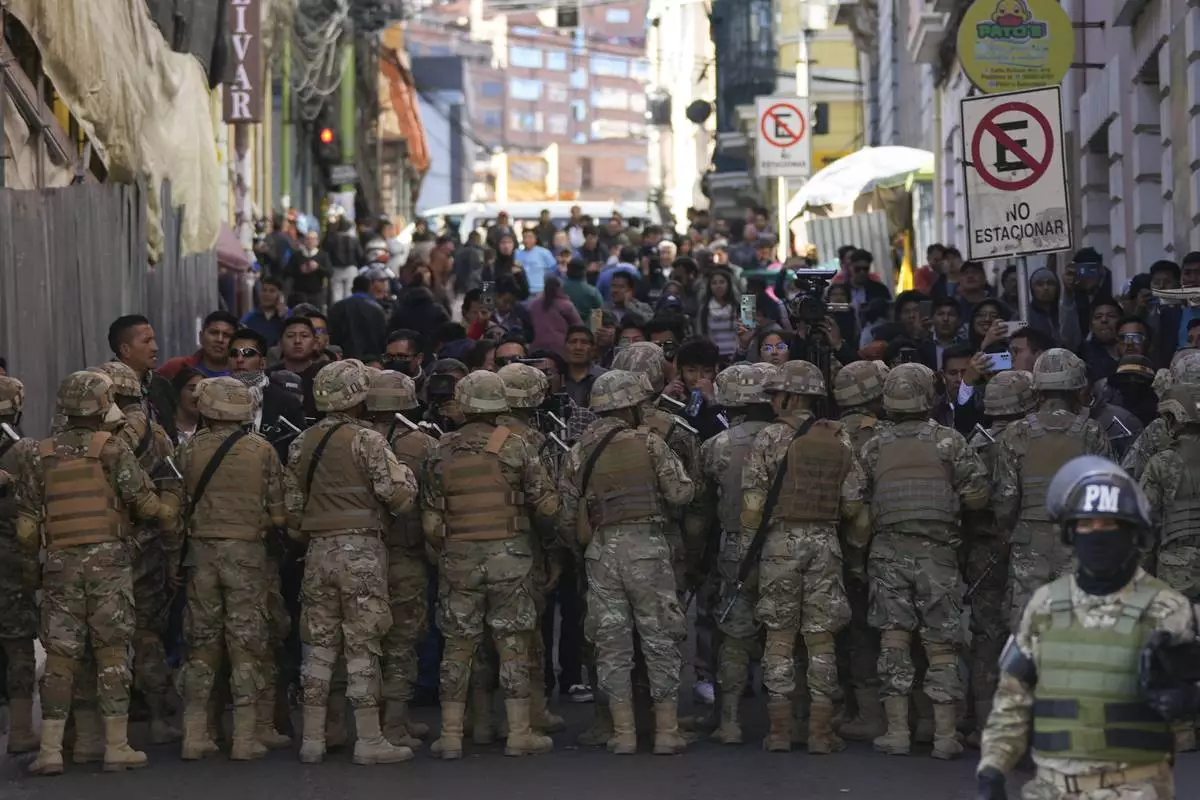
Military police block entry to Plaza Murillo in La Paz, Bolivia, Wednesday, June 26, 2024. Armored vehicles rammed into the doors of government palace located in Plaza Murillo, on Wednesday, as President Luis Arce said the country faced an attempted coup. (AP Photo/Juan Karita)
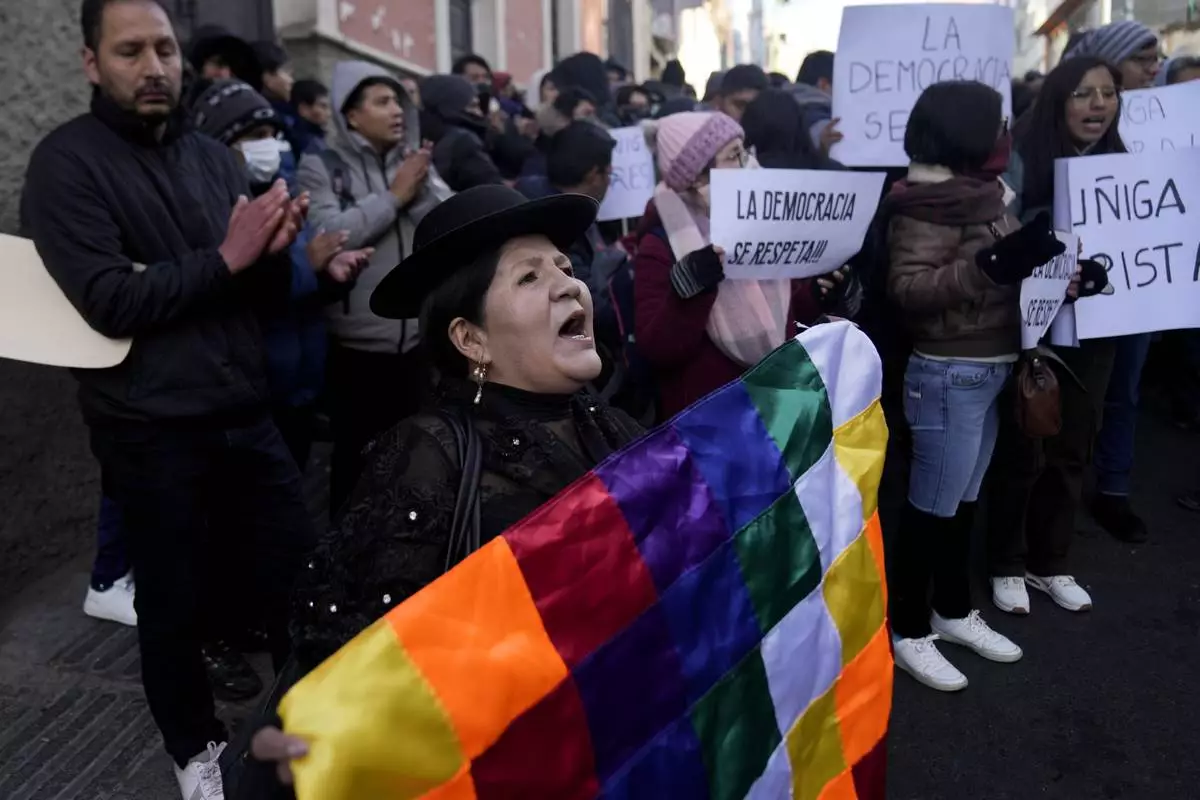
Alicia Chura, a supporter of Bolivian President Luis Arce, shouts against Juan Jose Zuniga, a former top Army general who led some soldiers to storm the presidential palace, outside police offices in La Paz, Bolivia, Thursday, June 27, 2024. The rebellion was short-lived as authorities arrested Zuniga and his soldiers retreated. (AP Photo/Juan Karita)
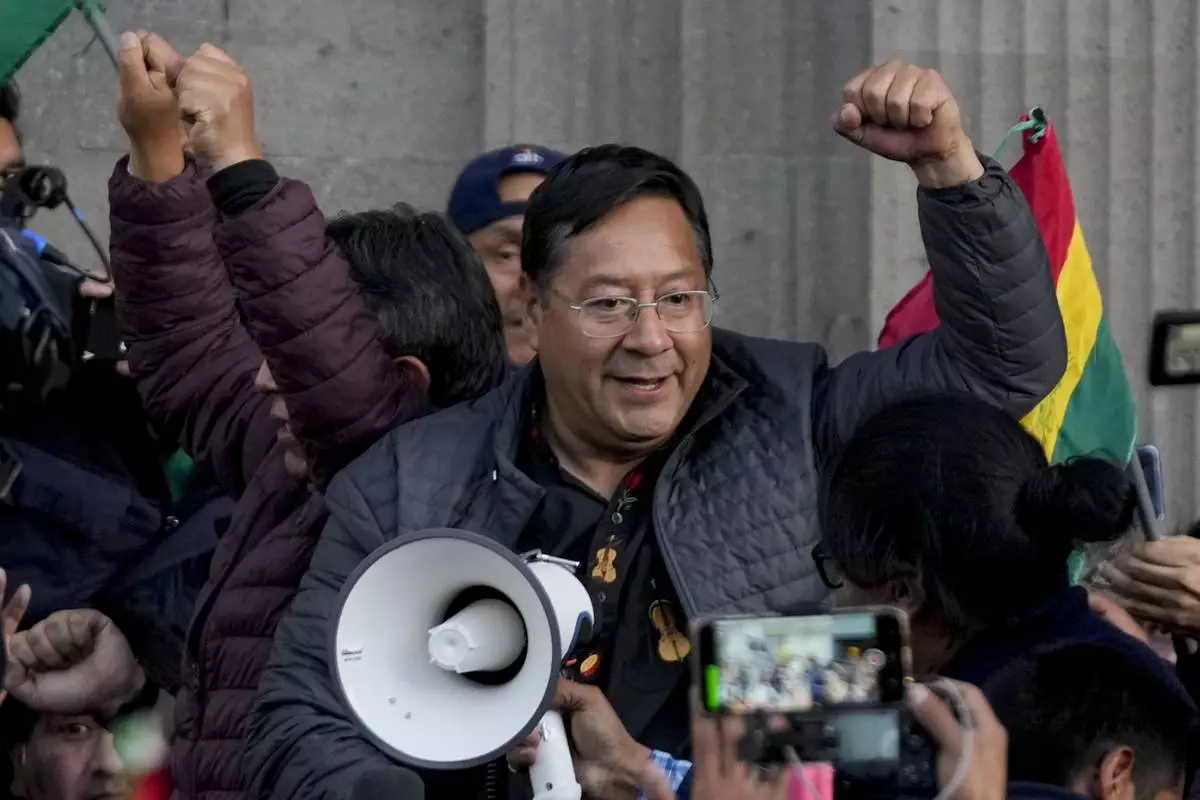
Bolivian President Luis Arce raises a clenched fist surrounded by supporters and media, outside the government palace in La Paz, Bolivia, Wednesday, June 26, 2024. Armored vehicles rammed the doors of Bolivia's government palace Wednesday in an apparent coup attempt against Arce, but he vowed to stand firm and named a new army commander who ordered troops to stand down. (AP Photo/Juan Karita)
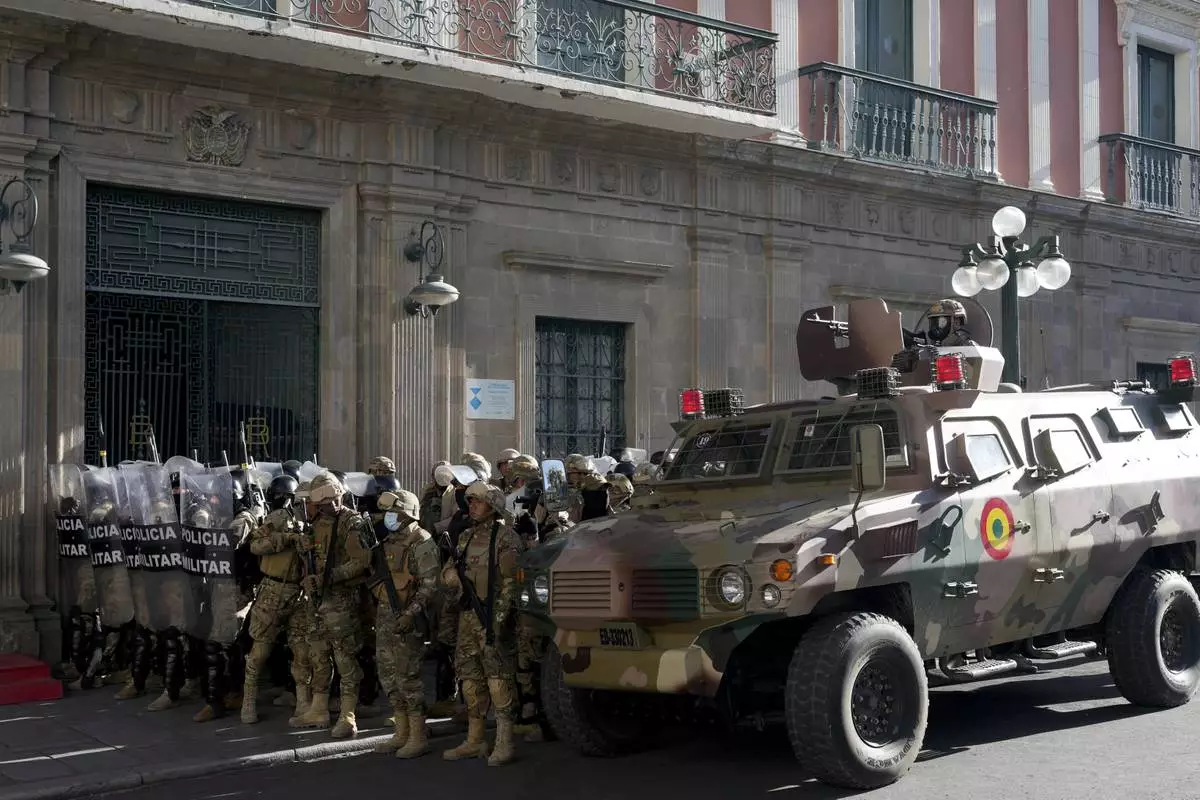
An armored vehicle and military police form outside the government palace at Plaza Murillo in La Paz, Bolivia, Wednesday, June 26, 2024. Armored vehicles rammed into the doors of Bolivia's government palace Wednesday as President Luis Arce said the country faced an attempted coup. (AP Photo/Juan Karita)
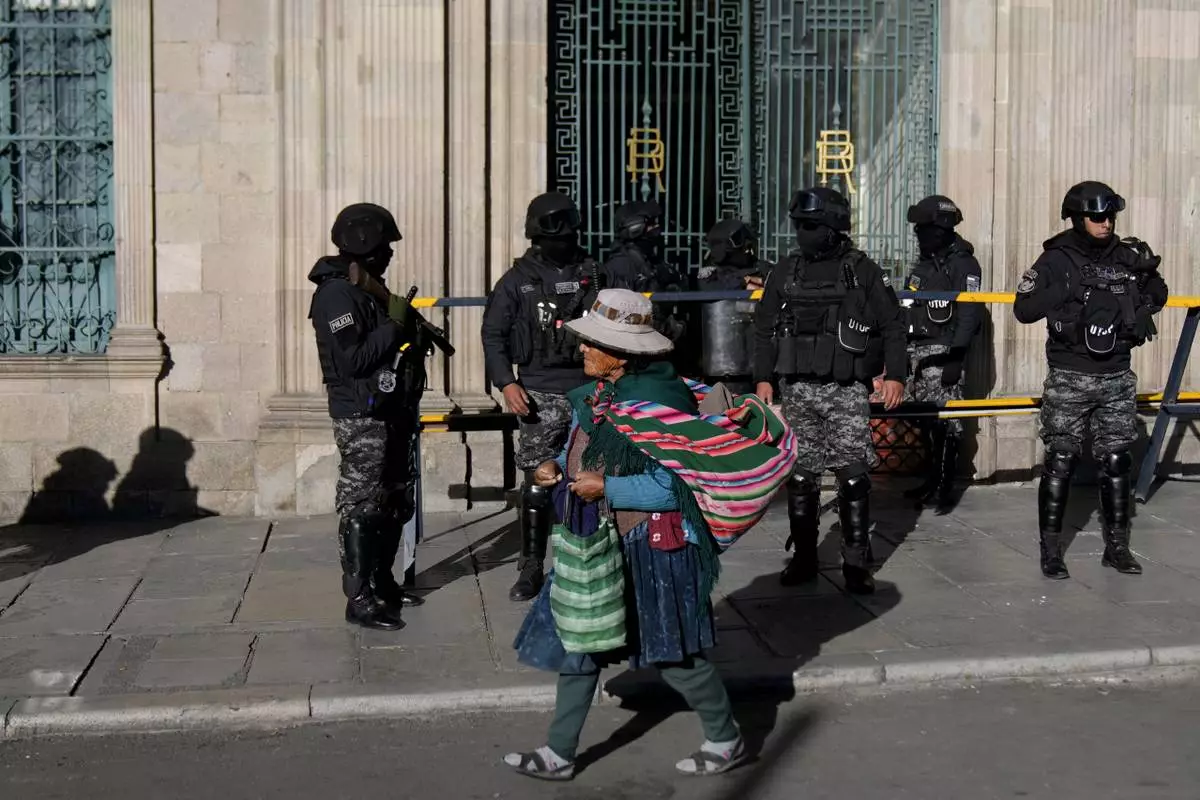
Police guard the government palace the day after a former top Army general led some soldiers to storm the building in La Paz, Bolivia, Thursday, June 27, 2024. The rebellion was short-lived as authorities arrested the general and his soldiers retreated. (AP Photo/Juan Karita)
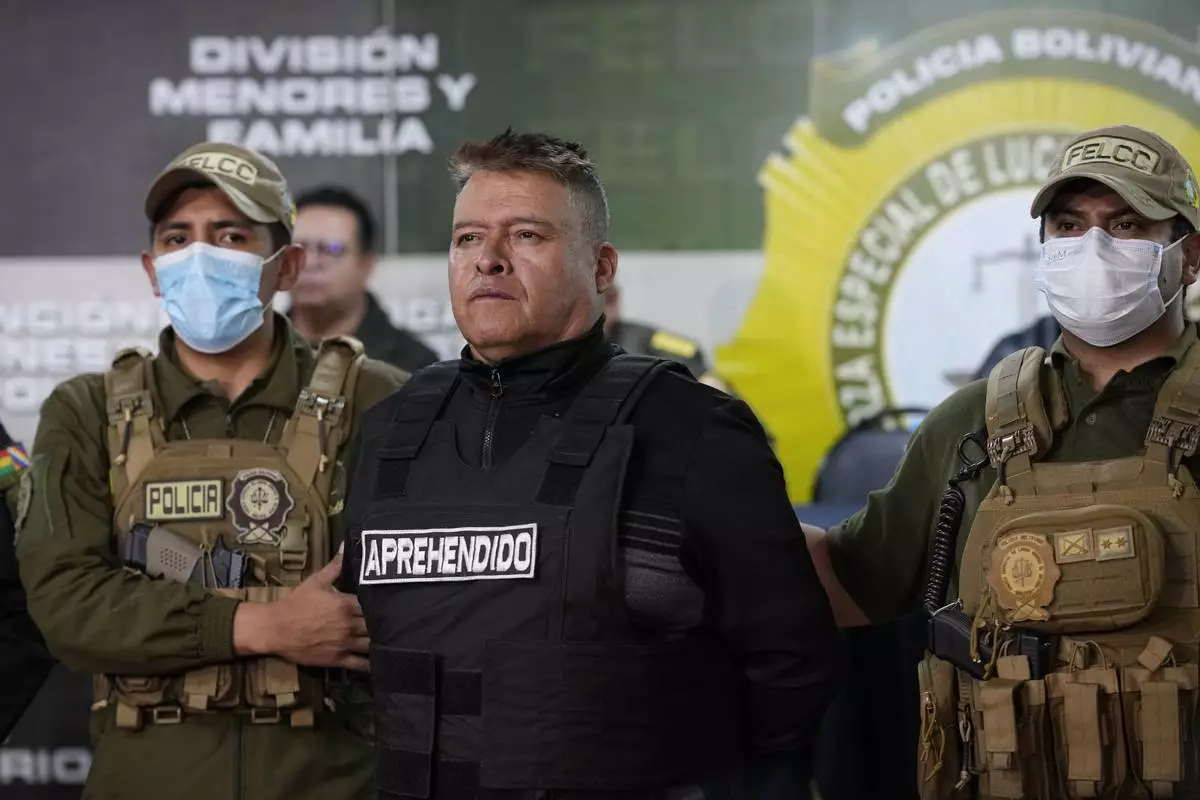
Bolivian police hold the detained Juan Jose Zuniga, former general commander of the Army, in La Paz, Bolivia, Wednesday, June 26, 2024. An apparent failed coup attempt erupted Wednesday in the country, and Zuniga appeared to be leading the rebellion. (AP Photo/Juan Karita)
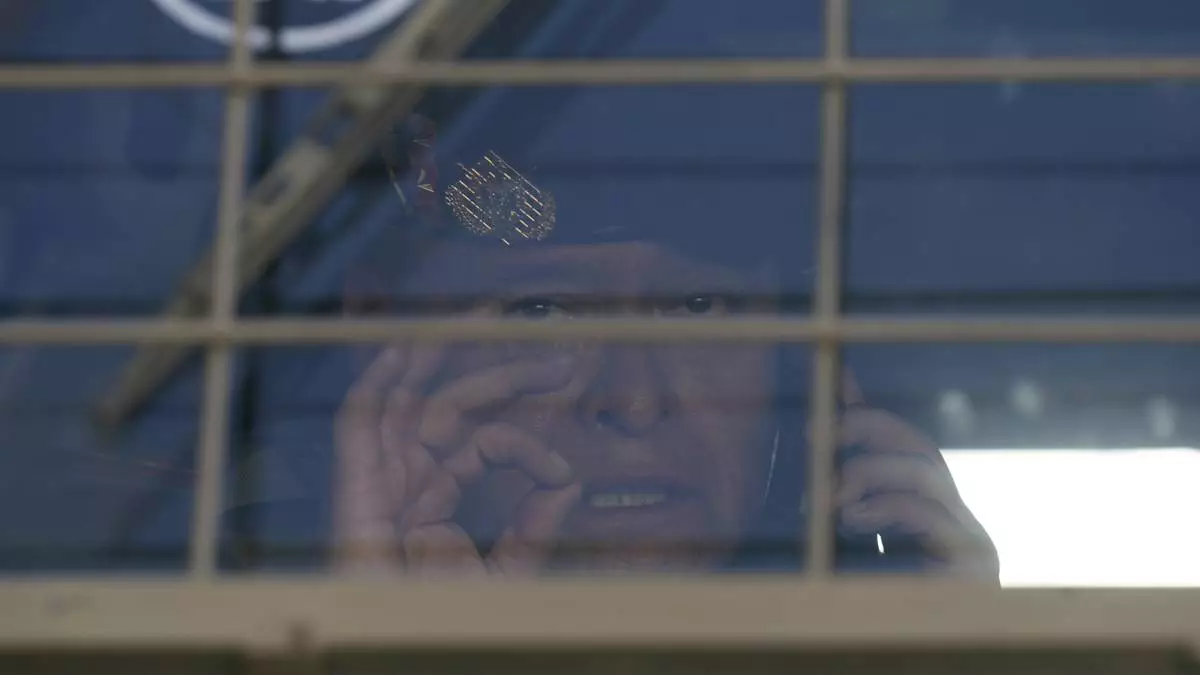
Army Cmdr. Gen. Juan Jose Zuniga sits inside an armored vehicle at Plaza Murillo in La Paz, Bolivia, Wednesday, June 26, 2024. Armored vehicles rammed into the doors of Bolivia's government palace Wednesday as President Luis Arce said the country faced an attempted coup. (AP Photo/Juan Karita)
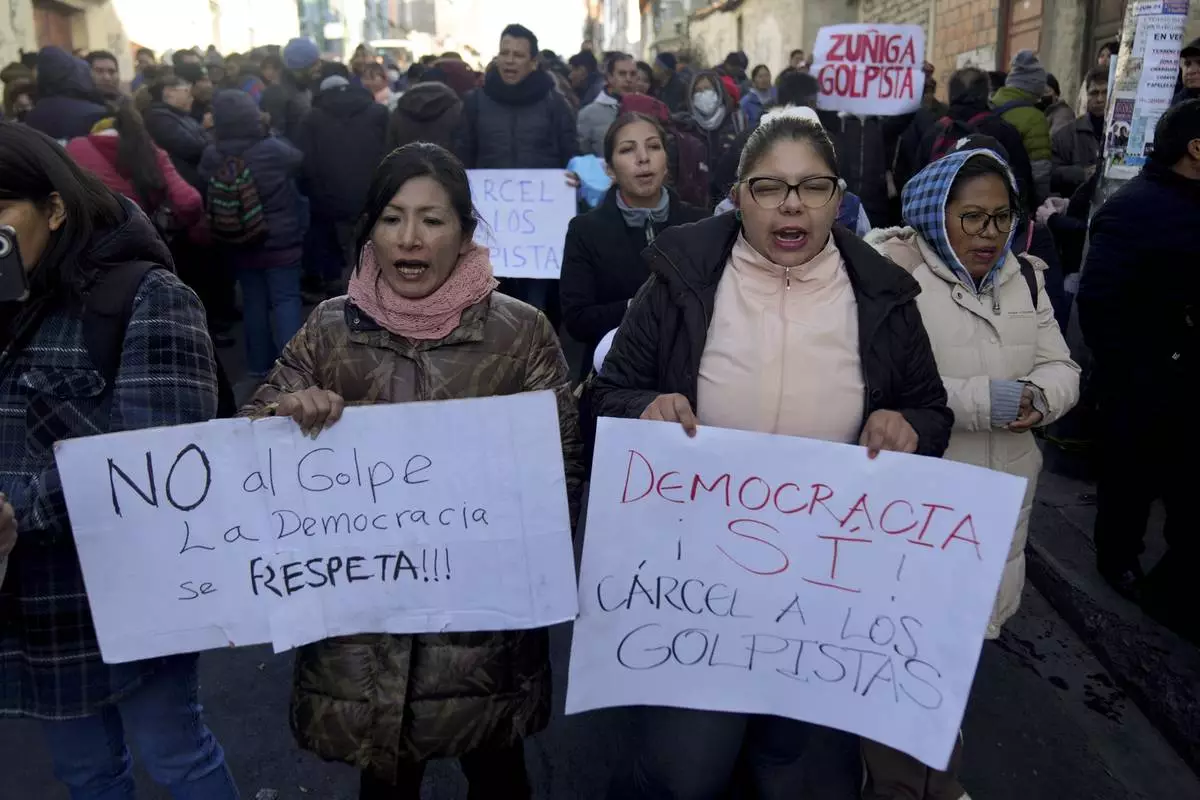
Supporters of Bolivian President Luis Arce protest against Juan Jose Zuniga, a former top Army general who led some soldiers to storm the presidential palace, outside police offices in La Paz, Bolivia, Thursday, June 27, 2024. The signs read in Spanish, left, "No to the coup. Respect democracy!" and "Yes to democracy! Jail the coup plotters." Authorities arrested Zuniga and his soldiers retreated the previous day. (AP Photo/Juan Karita)





